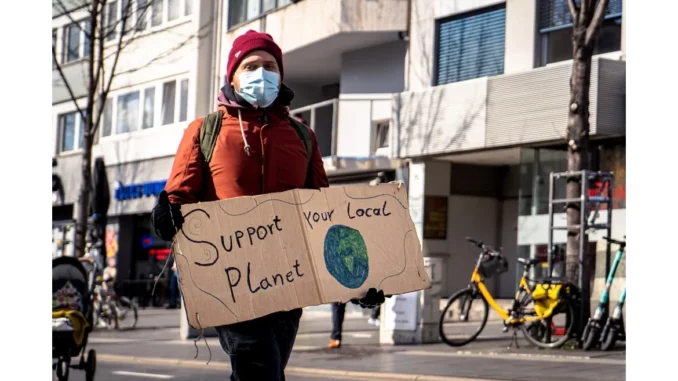
On a sunny Tuesday afternoon, Melrose Avenue in Birmingham appeared to be an ordinary British street. However, a closer inspection revealed a remarkable transformation. Eye-catching orange benches and communal pink bicycles hinted at an extraordinary community effort at play. This metamorphosis was spearheaded by residents like Jan Burley, a retired social worker who has lived on the street for over three decades.
Focus360 Energy: property compliance services – pre-planning to post-construction. Learn more.
Jan, who now spends her afternoons helping children water mint and coriander in shared planters, shared her journey with me. “I didn’t engage in gardening until I was 60, but if you can get children involved early, they will be more invested in the future of our world,” she said, her eyes glinting with enthusiasm. Today, communal furniture and budding apple and almond saplings adorn the street, but it wasn’t always this way. Over the past 30 years, concrete slabs had gradually replaced the once verdant lawns and flowerbeds.
The transformation began in 2023 with the launch of Retrofit Balsall Heath, a movement aimed at preparing homes and green spaces for the impending climate emergency, characterised by soaring temperatures and wetter winters. Jan was among 650 households that received grant funding for a retrofit, convinced after a volunteer from the initiative knocked on her door.
“Initially, I was sceptical,” Jan admitted. “But seeing the community come together convinced me. It wasn’t just about improving the house but improving our way of living.”
The Retrofit Balsall Heath coalition, which includes community groups, mosques, and churches, was established to utilise £10 million from the government’s local authority delivery phase 3 (LAD3) to upgrade low-income homes. The upgrades included solar panels, insulation, and other energy-efficient measures. However, the funding was short-lived, ending in 2023, leaving the community appealing to the Labour government for more sustained and community-led initiatives.
Sara Mia, a coordinator at Retrofit Balsall Heath, expressed her concerns about the abrupt end of government schemes. “The way the last government started and abruptly stopped schemes was disastrous, exacerbating the problem of a serious lack of trained, accredited professionals,” she said. Sara herself had faced issues when her installer went out of business after the green homes grant funding dried up. Despite these setbacks, the community remained hopeful and resilient.
The concept of community-led retrofits is not unique to Birmingham. Nearby Ladywood boasts Civic Square, a community-led organisation that published the 3ºC Neighbourhood research in April. This research explores how residents of the West Midlands can adapt to potentially extreme summer temperatures by 2030. Civic Square has also collaborated with economist Kate Raworth to integrate her doughnut economics theory into their projects, focusing on sustainable living and community resilience.
Immy Kaur, the co-founder of Civic Square, elaborated on how the organisation supports retrofits through various initiatives, ranging from weekly skills-sharing sessions and supper clubs to an intensive regenerative building course in partnership with the architectural firm Material Cultures. “We aim to cultivate skills within communities, making retrofitting a communal effort rather than an isolated task,” Immy said.
The regenerative building course attracted participants like Kez Sleeman, who joined after purchasing his first home and realising the flaws of modern building materials. “The reality of the climate emergency is being exploited by an industry that promises quick insulation fixes using synthetic materials,” Kez noted. “But being more considered opens up opportunities to do things communally.”
In 2023, Civic Square hosted the Retrofit Reimagined festival, a two-month event focusing on community-led regenerative building. This year, they are emphasising retrofitting and rewilding streets, with initiatives spreading across the UK. On Andover Road in Bristol, residents closed the street for a day to engage in community activities and discuss ideas for shared herb gardens and bike storage.
Melissa Mean, the director at WeCanMake in Bristol’s Knowle West area, highlighted the social aspect of retrofitting. “Part of this retrofit is about social relationships,” she said, underscoring the importance of community bonds in these projects.
Back in Birmingham, Immy Kaur believes that while communities can lead the way, the government must support them with funding and infrastructure. Drawing a parallel to the founding of the NHS in 1948, she called for a vision that could equally transform the health of both the planet and its people. “We are preparing for the worst by building something much better,” Immy concluded.
As I departed from Melrose Avenue, the sense of community and purpose was palpable. The residents were not merely retrofitting their homes; they were reimagining their futures. In the face of a climate crisis, they were constructing something better, one step at a time.


Be the first to comment